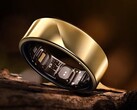Luna's latest smart ring comes with its own dedicated LifeOS, touted to "decode" the ways in which the user's physical and perhaps even mental health is affected by the world around it by tracking numerous vital signs over time.
They include a skin temperature sensor in addition to those for blood oxygen, heart rate and pulse oximetry. They are backed to help LifeOS 'learn' the wearer's "circadian alignment" (or 'body clock') over time to generate more and more personalized health and fitness insights via its own AI voice coach.
The 2.0 ring is also touted to deliver in-depth sleep-tracking, with metrics such as sleep latency, sleep efficiency, sleep cycles, respiratory performance and circadian rhythm alignment in general.
The wearable is also rated for predictive and individualized fertility tracking, as part of its "comprehensive activity logging" features.
Unlike some of its competitors such as those from Ultrahuman and Oura, it does not require a subscription. Luna claims that the data it collects is stored "securely" (although the brand does not say where exactly) and is never shared without the user's "explicit consent, in accordance with global data protection standards".
The new ring is made of PVD-coated titanium for 5ATM water resistance and comes in rose or yellow gold colors as well as silver and Midnight or Lunar black. Its weight starts at 3.5 grams (g), though, compared to 2.5g in the Ultrahuman Ring Air.
The Luna 2.0 is rated for as much as 30 days of battery life - so long as it is bought along with a ring box-like charging case.
That Surge Charger bundle is priced at $349/£329, as opposed to $300/£300 for the Luna 2.0 with a less portable dock charger.
The latest Luna Ring is available worldwide from now via its own website, while the Ultrahuman Ring Air is currently listed on Amazon at $349.



























